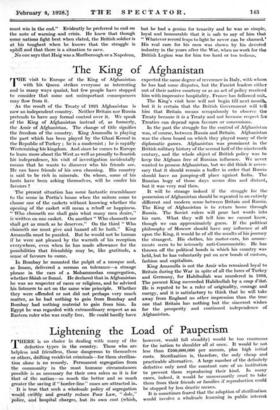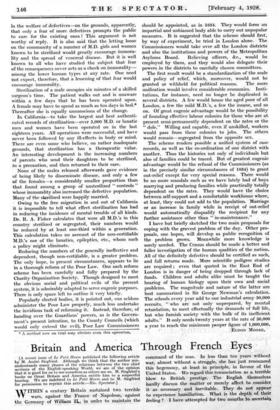Lightening the Load of Pauperism
THERE is no choice in dealing with many of the defective types in the country. Those who are helpless and friendless, those dangerous to themselves or others, drifting recidivist criminals—for them steriliza- tion alone is no remedy. Permanent segregation from the community in the most humane circumstances possible is as necessary for their own sakes as it is for that of the nation—so much the better and so much greater the saving if " border-line " cases are attracted in. ' It is true that such a wholesale policy of segregation would, sWiftly and greatly reduce Poor Law, " dole," pialiee, and hospital charges, but its own cost (which, however, would fall steadily) would be too enormous for the nation to shoulder all at once: It would be not less than £100,000,000 per annum, plus high initial costs. Sterilization is, therefore, the only cheap and practicable alternative. A large number of the definitely defective only need the constant care of an institution to prevent them reproducing their kind. In many cases, indeed, it would be unnecessarily cruel to take them from their friends or families if reproduction could be stopped by less drastic means. It is sometimes feared that the adoption of sterilization would involve a wholesale lessening in public interest in the welfare of defectives—on the grounds, apparently, that only a fear of more defectives prompts the public to care for the existing ones ! This argument is not worthy of reply. It is also said that the letting loose on the community of a number of M.D. girls and women known to be sterilized would greatly encourage immora- lity and the spread of venereal disease. But it is well known to all who have studied the subject that fear of the consequences never acts as a check on immorality— among the lower human types at any rate. One need not expect, therefore, that a lessening of that fear would encourage immorality.
Sterilization of a male occupies six minutes of a skilled surgeon's time. The patient walks out and is unaware within a few days that he has been operated upon. A female may have to spend as much as ten days in bed.* Thereafter she is equally unconscious of the change.
In California—to take the largest and best authenti- cated records of sterilization—over 5,000 M.D. or lunatic men and women have been operated on in the last eighteen years; All operations were successful, and have never been followed by any ill-effects in -body or mind. There are even some who believe, on rather inadequate grounds, that sterilization has a therapeutic value. An interesting development is the increasing numbers of parents who send their daughters to be sterilized, as a precaution, and then returned to their care.
None of the males released afterwards gave evidence of being likely to disseminate disease, and only a few of the females—a considerably smaller proportion than that found among a group of unsterilized " controls " whose immorality also increased the defective population. Many of the sterilized were happily married.
Owing to the free migration in and out of California it is impossible to tell what effect sterilization has had in reducing the incidence of mental trouble of all kinds. Dr. R. A. Fisher calculates that were all M.D.'s in this country sterilized or segregated, their numbers would be reduced by at least one-third within a generation. This calculation takes no account of the non-certifiable M.D.'s nor of the lunatics, epileptics, etc:, whom such a policy might eliminate.
Reducing the numbers of the generally ineffective and dependent, though non-certifiable, is a greater problem. The only hope, in present circumstances, appears to lie in a thorough reform of the Poor Law. One such reform scheme has been carefully and fully prepared by the Charity Organization Society. Though designed to meet the obvious social and political evils of the present system, it is admirably adapted to serve eugenic purposes. There is only space left to outline it very briefly.
Popularly elected bodies, it is pointed out, can seldom administer the Poor Law properly, much less undertake the invidious task of reforming it. Instead, therefore, of handing over the Guardians' powers, as is the Govern- ment's present intention, to the County Councils (which would only extend the evil), Poor Law Commissioners * A method now on trial may obviate even this operation. should be appointed, as in 1884. They would form an impartial and unbiassed body able to carry out unpopular measures. It is suggested that the scheme should first, by way of experiment, be tried in London alone. The Commissioners would take over all the London districts and also the institutions and powers of the Metropolitan Asylums Board. Relieving officers, &c., would be employed by them, and they would also delegate their powers in the districts to carefully chosen committees.
The first result would be a standardization of the scale and policy of relief, which, moreover, would not be granted or withheld for political reasons. The mere unification would involve considerable economies. Insti- tutions, for instance, need no longer be duplicated in several districts. .A few would house the aged poor of all London, a few the mild M.D.'s, a few the insane, and so on. Of great eugenic advantage would be the possibility of founding effective labour colonies for those who are at present semi-permanently dependent on the rates or the " dole." Willing and capable, even if unskilled, workers would pass from these colonies to jobs. The others would remain—segregated from the opposite sex.
The scheme renders possible a unified system of case records, as well as the co-ordination of one district with another. Thus the histories not only of individuals but also of families could be traced. But of greatest eugenic advantage would be the refusal of the Comriaissioners (as in the precisely similar circumstances of 1884) to grant out-relief except for very_ special reasons. There would be no more scandals such as we have lately had of boys marrying and producing families while practically _totally dependent on the rates. They would have the choice betweeri self-support and a comfortable workhouse where, at least, they could not add to the population. Marriage or an increase in family while in receipt of out-relief would automatically disqualify the recipient for any further assistance other than " in-maintenance." .
I have but briefly sketched the two main proposals for coping with the gravest problem of the day. Other pro- posals, one hopes, will develop as public recognition of the problem grows. Meanwhile more knowledge is sorely needed. The Census should be made a better and fuller investigation of the human qualities of the nation. All of the definitely defective should be certified as such, and full returns made. More scientific pedigree studies are required ; even that quoted in the East End of London is in danger of being dropped through lack of funds. Children and adults alike must be taught the bearing of human biology upon their own and social problems. The magnitude and nature of the latter are best summarized in Sir George Newn-mn's calculation. The schools every year add to our industrial army-50,000 recruits, " "who are' not only unprepared; by mental retardation, to meet effectually the demands of full life, but who furnish society with the bulk of its inefficient adults." It only needs twenty years at the rate of 50,000 a year to reach the minimum pauper figure of 1,000,000.
ELDON MOORE.







































 Previous page
Previous page